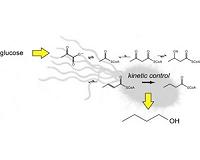 |
Cambridge, Mass. (UPI) Mar 4, 2011 A Cambridge, Mass., company says its genetically engineered microorganism can produce diesel fuel. In what it calls "liquid fuel from the sun," Joule Unlimited Inc.'s genetically engineered microorganism, known as cyanobacteria, needs only sunlight, carbon dioxide and water as inputs to "sweat" fuel. The process can use fresh, brackish or saline water. Unlike biofuels, it doesn't require biomass feedstock such as corn, grass or algae. Joule's technology, known as "helioculture," relies on solar converter systems that are arranged on open land spaces, similar to solar photovoltaic systems. The organisms -- housed under a glass sheet mounted on a frame that faces the sun -- eat, reproduce and then sweat. Water flowing through the system carries the resulting hydrocarbon fuel through a downstream system for separation. After the fuel is harvested, the organisms are re-circulated into the growing solution. Its bioreactors control heat and light to optimize growth. "Biofuels, by nature, are not scalable, whereas we have created technology where the solar converters are modular and therefore scalable," said Joule Chief Executive Officer Bill Sims, The Boston Herald reports. Sims told Biofuels Digest magazine that Joule's SolarConverter "is a device unlike any ever developed." It provides water to the organism, captures carbon dioxide and photons, mixes the solution, then handles product separation in a continuous process extinguishing all photons, he said. Sims said that the company's technology produces more power than the fossil energy it consumes. "We're not aware of any biofuel that can make that claim," he told the Herald. The company estimates that the organisms can produce 15,000 gallons of diesel fuel per acre a year for as low as $30 per barrel and ethanol for $50 a barrel. "We're at the vanguard of a new approach," Sims said of the company's technology. Techniques that use biomass -- corn, sugar or algae -- as an intermediate for the production of renewable fuels, he said, are an alternative to petroleum-based fuels. "We are a replacement," Sims said. The company has operated a pilot plant in Leander, Texas, and plans to break ground on a commercial-scale production plant this year. "Joule was formed not to improve upon existing biofuel processes but to create a new and transformational process altogether," Sims said in a statement. "We have channeled photosynthesis, the most productive energy-capture process on Earth, at efficiencies previously thought unattainable. Founded in 2007 by Flagship VentureLabs, Joule is privately held.
Share This Article With Planet Earth
Related Links Bio Fuel Technology and Application News
 Turning Bacteria Into Butanol Biofuel Factories
Turning Bacteria Into Butanol Biofuel FactoriesBerkeley CA (SPX) Mar 04, 2011 University of California, Berkeley, chemists have engineered bacteria to churn out a gasoline-like biofuel at about 10 times the rate of competing microbes, a breakthrough that could soon provide an affordable and "green" transportation fuel. The development is reported online this week in advance of publication in the journal Nature Chemical Biology by Michelle C. Y. Chang, assistant prof ... read more |
|
| The content herein, unless otherwise known to be public domain, are Copyright 1995-2010 - SpaceDaily. AFP and UPI Wire Stories are copyright Agence France-Presse and United Press International. ESA Portal Reports are copyright European Space Agency. All NASA sourced material is public domain. Additional copyrights may apply in whole or part to other bona fide parties. Advertising does not imply endorsement,agreement or approval of any opinions, statements or information provided by SpaceDaily on any Web page published or hosted by SpaceDaily. Privacy Statement |